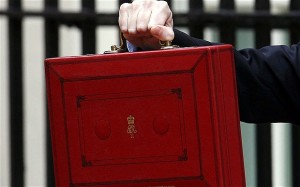The Budget 2012: How does it affect students?
 "This country borrowed its way into debt and now we will earn our way out" (George Osborne, 2012).
"This country borrowed its way into debt and now we will earn our way out" (George Osborne, 2012).
It was today - 21st March 2012 - that the Coalition government announced the new budget for 2012. George Osbourne (the Chancellor) addressed the Nation with the budget proposals for the coming year.
Despite the tuition fees on the up this year, there was no attention paid to our education system, nor students or graduates. The word "student" was mentioned just once in the whole 116 page Budget.
There were however many key and somewhat radical new meansures mentioned, most notably the increase in the threshold that working people (under 64) do not pay income tax on to £9,205 from April 2013. This April the amount is being raised from £7,475 to £8,150.
At the other end of the scale, the top tax income rate is reduced to 45% from 50%. Much of the Budget for 2012 is well documented, and many of the measures will affect the general population not just students and graduates (such as the proposed pension review).
When covering the 2011 Budget report we commented that "The UK is essentially in a financial position similar to most students; it’s in the red and desperate to get back into the black by any means." This year the same applies again, though there are some revised measures to help with the country's debt.
How the 2012 Budget may affect students
- Alcohol duty to stay the same - Students don't like to fall under the stereotype of drinking all of the time but students as a population consume a large amount of alcohol. Luckily alcohol escaped another increase on top of the current increase in duty that is planned at 2% above inflation.
- Tobacco duty increased by 5% - The price of a packet of cigarettes will now go up by around 37p a packet at 6pm tonight. This may not seem like much but over time it can stack up. No better time to quit!
- Threshold for income tax will be set at £9,205 - This means that students and graduates alike will be able to earn up to £9,250 in a year without paying tax (as of April 2013). A whopping 2 million people will benefit from this.
- Inflation predicted to fall to 1.9% - Next year the inflation percentage is predicted to fall. This has a direct impact on students as it will mean the cost of many day to day goods will stop increasing at such a high rate.
- Unemployment is predicted to fall - This means that graduates and current students should be better off when looking for a job. This is not to say that the youth unemployment problem in the UK has been resolved but simply the growth in unemployment stemmed.
- Investment in Afghanistan to drop - The cost of funding the UK's mission in Afghanistan until 2015 will be £2.4bn lower than previously forecast. This will not directly affect students but does free up money in the budget to be spent on education. Wishful thinking maybe?
- 1% cut in corporation tax - This is great for any students looking to start a business. More broadly this benefits the economy as companies have more money availble, increasing spending which should trickle down to workers. Should also attract more foreign investment and help employment rates.
We'd be interested to know how you feel you will be affected by the Budget report. Let us know in the comments below.








